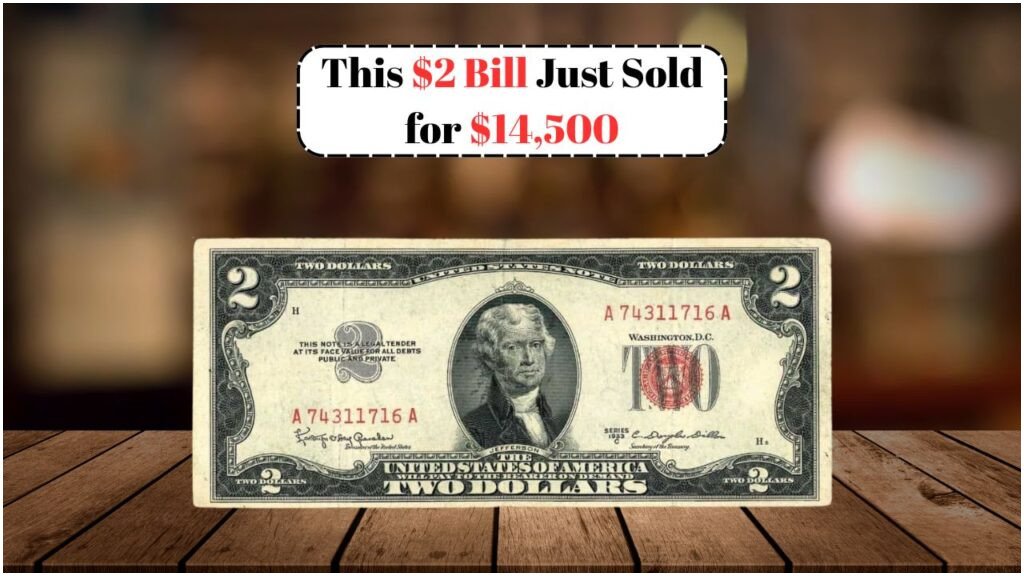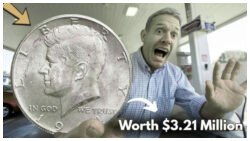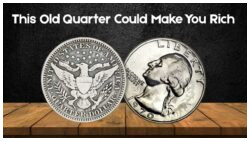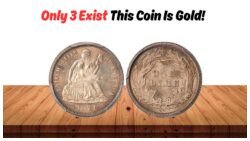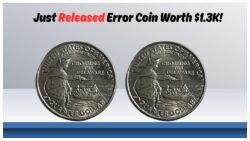$2 Bill Rare Red Seal – Have you ever thought a simple $2 bill could be worth thousands of dollars? Most people don’t even pay attention to the small change in their wallets. But recently, a rare $2 bill with a red seal was sold at auction for a whopping $14,500, shocking collectors and casual holders alike. If you’re lucky, you might already own one without even realizing it. Many people dismiss $2 bills as novelty or outdated, but collectors know better. Certain versions, especially those with red seals, are highly valuable due to their rarity and historical significance. In this article, we’ll break down what makes these bills special, which ones are worth the most, how to identify them, and how you can get them appraised or sold.
What Is a Red Seal $2 Bill?
Red seal $2 bills were issued by the United States government as part of the United States Notes series between 1928 and 1963. Unlike the more recent green-seal bills (Federal Reserve Notes), red seals are rarer and were printed in limited batches.
Key characteristics of red seal $2 bills:
- A red-colored Treasury seal on the right-hand side
- Red serial numbers
- The words “United States Note” at the top of the bill
- Printed between 1928 and 1963
These features make them immediately identifiable and highly sought after by collectors.
Why Was One Sold for $14,500?
Not all red seal $2 bills are worth thousands, but certain versions are incredibly rare. The one sold for $14,500 had multiple features that increased its value significantly:
Factors that boosted its value:
- Uncirculated condition (no folds, creases, or marks)
- 1928B series, which is among the rarest
- A low serial number (e.g., starting with 0000)
- Star note (denoted by a star symbol near the serial number)
- High collector demand during the auction
Even though millions of red seal $2 bills were printed, very few remain in pristine condition today, especially those from early series.
Most Valuable Red Seal $2 Bill Series
Let’s look at which red seal series are worth the most in the market today. Below is a comparison table of popular red seal $2 bill series and their average values in collector markets.
| Series Year | Condition | Estimated Value (USD) | Special Features |
|---|---|---|---|
| 1928B | Uncirculated | $2,000 – $14,500 | Low serial, star note |
| 1928D | Crisp Uncirculated | $500 – $1,200 | Rarity + red seal |
| 1953A | Very Fine | $15 – $75 | Some collectible appeal |
| 1963 | Circulated | $5 – $20 | Common red seal issue |
| Star Notes | Any | +50% value premium | Identified with a ★ symbol |
| Fancy Serial | Uncirculated | Up to $10,000+ | Repeating digits, low serial |
As seen above, earlier series from the 1920s are far more valuable, especially if they are in uncirculated or mint condition.
How to Know If Your $2 Bill Is Valuable
Not every red seal $2 bill is going to make you rich, but there are certain things you can look for that indicate higher value. Here’s a checklist to examine your $2 bill:
Check These Key Features:
- Seal Color: Red = Older and rarer than green.
- Series Year: 1928 and 1953 series are more valuable than 1963.
- Serial Number: Low (e.g., 00000123), repeating (e.g., 12121212), or fancy (e.g., 12344321).
- Star Note: Look for a star symbol (*) at the beginning or end of the serial number.
- Condition: Crisp, uncirculated notes are always worth more.
- Errors: Printing errors like misalignments can boost value significantly.
If your $2 bill matches multiple factors from this checklist, it’s time to get it appraised.
Where to Sell or Appraise a Rare $2 Bill
If you suspect your red seal $2 bill might be valuable, here are the best options to have it checked and potentially sold:
Trusted Appraisal & Selling Options:
- Professional Coin & Currency Dealers: Certified appraisers can give accurate evaluations.
- Auction Houses: Heritage Auctions, Stack’s Bowers, and others handle high-value currency.
- eBay and Etsy: Good for moderately valuable bills, especially with verified buyer interest.
- Online Forums: Sites like Reddit’s r/papermoney or Collectors.com can help get opinions.
- Currency Grading Services: Services like PMG (Paper Money Guaranty) or PCGS Currency offer authentication and grade certification that boosts resale value.
Getting your note graded professionally can significantly increase its resale price if it’s in good condition.
How to Preserve Your $2 Bill Properly
If you own a potentially valuable $2 bill, you must avoid damaging it. Any folds, creases, or ink marks can reduce its value dramatically.
Storage Tips:
- Use acid-free currency sleeves or holders.
- Store in a cool, dry place away from sunlight.
- Avoid touching with bare hands – use cotton gloves if possible.
- Do not laminate or tape the bill.
The better the condition of your note, the higher the collector value you can expect.
It’s easy to ignore small denominations like $2 bills, but they could be hiding real treasure. A rare red seal $2 bill sold for $14,500, and many more are still floating around in wallets, old drawers, and inherited collections. Before you spend that $2 on coffee, take a closer look—it could be worth more than your monthly rent.
FAQs of $2 Bill Rare Red Seal
1. What does the red seal on a $2 bill mean?
It indicates the bill is a United States Note, not a Federal Reserve Note, making it rarer and more collectible.
2. Are all red seal $2 bills worth thousands?
No, only rare series in uncirculated or special condition can reach high values. Most are worth between $5–$50.
3. How can I tell if my $2 bill is a star note?
Look for a ★ (star) symbol at the beginning or end of the serial number.
4. Can I sell my $2 bill on eBay?
Yes, especially if it has collectible value. Include clear pictures and details like year, series, and serial number.
5. Is it illegal to own or sell old U.S. currency?
No, it’s perfectly legal. In fact, there’s a thriving market for collectible U.S. bills and coins.

